A Quick Note On Love Letters To A Freelance Writer: This is a select batch of emails I sent to a group of writers I was coaching. I intend to publish the entirety of them as a collection.
You can read Part One of these selections here.
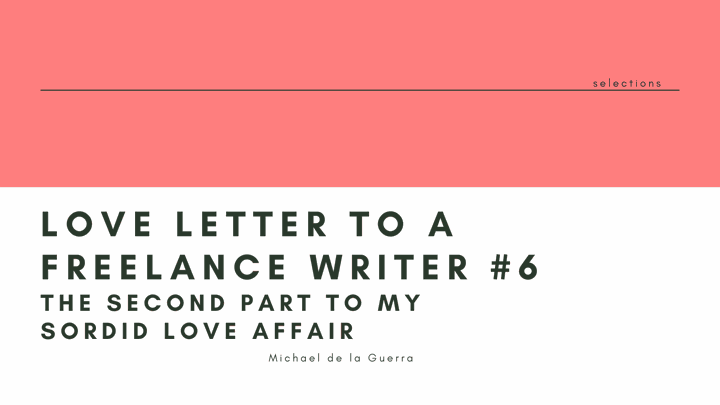
Love Letter To A Freelance Writer #6: The second part to my sordid love affair
“But I wouldn’t say that.” Marisol sat up on the bed in her underwear, crossed her arms, and looked at me.
She had agreed to play herself in the movie I wrote about her, and since it was (or so I thought) unspoken knowledge that I had written it about her, we were running into problems.
First, I had about 3 days to cut the short film I was creating for the competition I wanted to enter. Second, Marisol—knowing it was about her or not—wanted to change lines. “I know it’s not what you would actually say, but you’re doing such a good job delivering the line, don’t worry about it,” I said. She smiled, and we kept rolling.
Once we finished, I spent the next two days sweating profusely and editing together what I had. The deadline for entries was Sunday at 11:59 p.m., and on Saturday afternoon everything came crashing down. I didn’t have a particular shot—one that tied the whole film together. All the emotional torment I put myself through working with someone I had written about, without either of us acknowledging it, was worth it until that moment. I felt like a poor kid conscious of how hard his parents had to work to buy him his first bike, only to realize one day it had been stolen.
I was so depressed, I was bedridden. My friend Bella had to literally drive to my house and get me out of bed so I would finish editing. On Sunday, I was reborn (pun intended). I found a long take we had done that would complete the footage I needed to make a cohesive narrative. And so I banged away at my keyboard for hours, finally coming to a stop at 10:30 p.m.
I collected myself and started to export my edit. Currently I’m writing to tell you this from a new computer that I paid a crazy amount of money for. Why is that an important detail? Well, because at about 11:30 p.m., thirty minutes before the deadline… my computer crashed. I tried to restart it and export the movie in time, but I watched that blue loading bar sluggishly move along right as the clock hit midnight. This meant I wouldn’t be able to enter my film into the competition. Heartbreaking, I know. I’ll touch on the aftermath in the future, but here are a couple things I learned:
One, any action is better than no action. I learned so much about myself as a writer and filmmaker (and professional human). Now I know what to expect going into subsequent projects. Had I done nothing, not only would I not have this great story to tell you, but my first short film would have been just an “idea.” Having an idea is one thing: executing on that idea is entirely different.
Two, it gave me the confidence that venturing into the unknown—while scary—doesn’t mean you’ll die. You might hit some road bumps, and even if it all falls apart, you’ll also take more confidence with you into the next chapter of your life.
So, dear reader, even though “Coffee Shop Crush” never made it into the competition (one I was sure I was going to win), it provided me with confidence to keep going. If you’re at a stage in your career where the next move feels like the unknown, just go for it. You’ll learn so much more about yourself than if you don’t do anything at all.
- M
P.S. Are you enjoying these emails so far? Like I said, you should keep me accountable if I’m not delivering on the “infotainment” goods. Reply to this email and let me know if you are!
And keep an eye on that inbox for the next email, where I’ll share a piece of advice I see on almost every single blog about freelance writing, and why it could actually be slowing down your growth. If you’ve ever been told to “write about what you’re interested in,” you’ll definitely want to scope it out.
Coffee Shop Crush: The Script
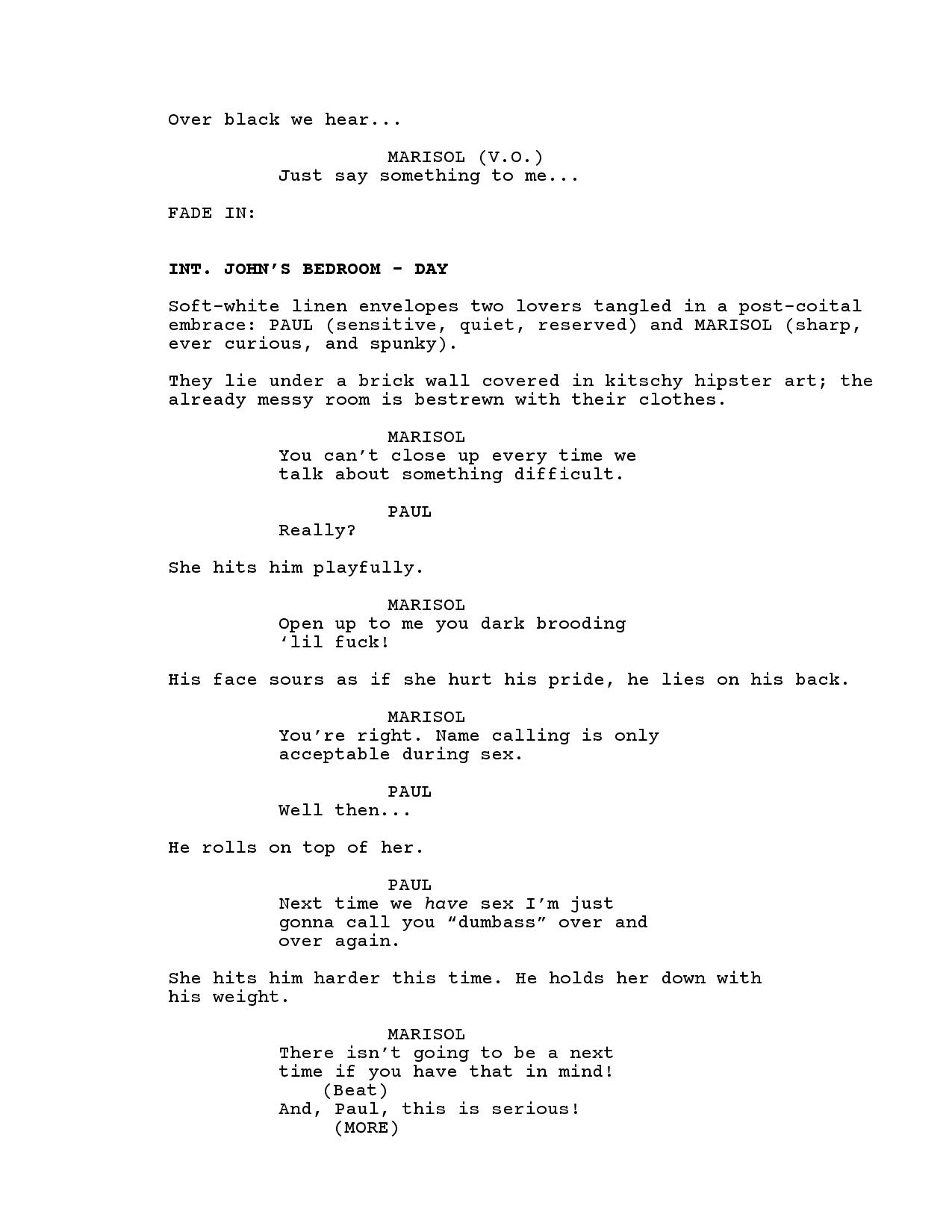
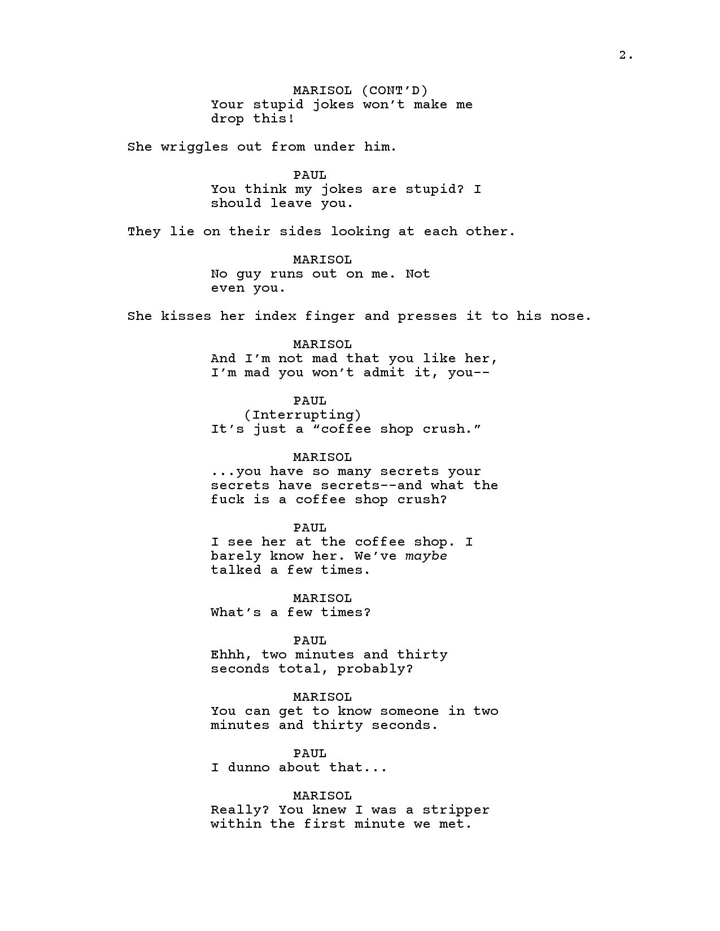
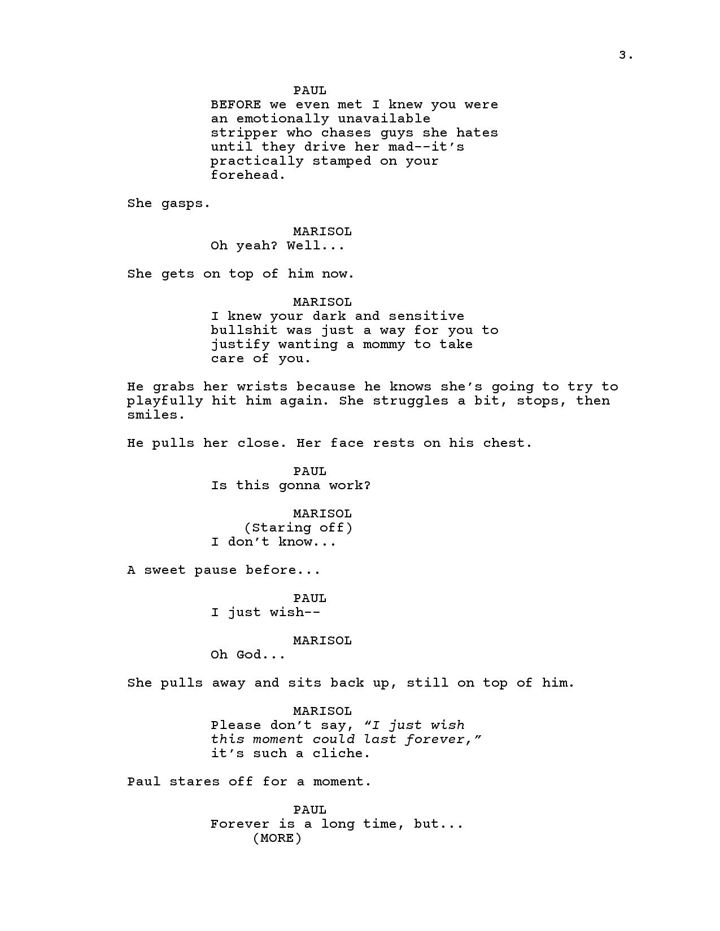
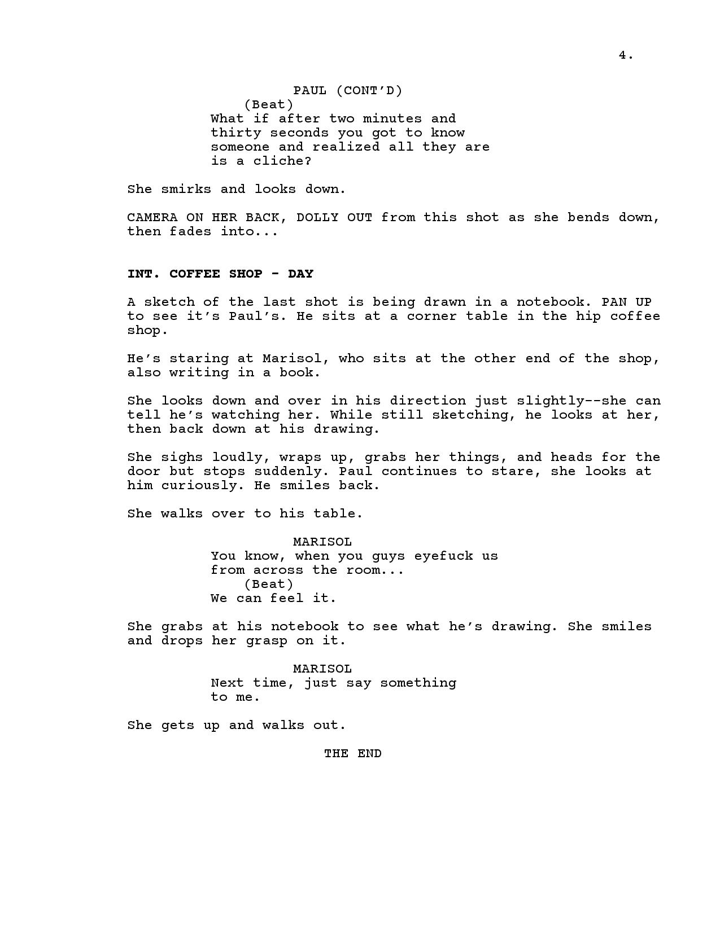
The film had to be under three minutes for the contest. The idea was that you were getting to know these people in that amount of time, except it was just a daydream. Which is a cliche, and I thought it was cheeky to call it out by having Paul say as much in his line. When I was editing the footage, I didn't like the actor's delivery. It probably had more to do with the line not being that great in the first place. So I cut it, and there was a beautiful moment between the two actors: they just stared at each other, bringing the line "Do you think this is going to work?" to life through action. Two people exhausted with each other, very much in love, but unsure if the relationship will last. We've all been there. And even though nothing much came of this short film, I'm proud I was able to communicate such an experience through a few seconds of video.
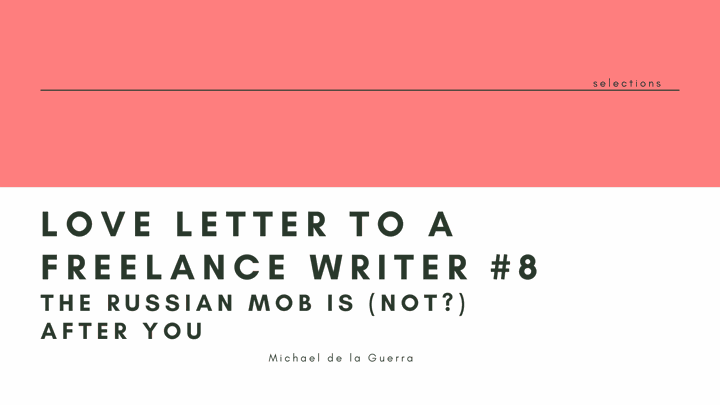
Love Letter To A Freelance Writer #8: The Russian mob is (not) after you
Dear reader,
A friend of a friend (let’s say) was recently arrested for a string of high-profile robberies. My friend was stunned. She had no idea how this person she’d known for so long could do such a thing. But when she explained a bit more about the situation to me, it was clear what had happened.
His girlfriend was a Russian escort…
He’d all of a sudden been palling around with Russians who seemed unsavory…
He was a “real estate broker” who hadn’t sold a house in a year, yet somehow spent money extravagantly…
He was given $20K cash to place bets for someone else in an illegal gambling ring…
So I explained to her how organized crime works, and how her friend was likely used by some shady people to launder money (the 32 counts of money laundering brought on by the District Attorney would agree). She didn’t believe me. Why? Because she didn’t want to. It was too hard for her to see what was right in front of her. At work here is confirmation bias, which is:
“The tendency to search for, interpret, favor, and recall information in a way that affirms one's prior beliefs.”
As a marketer and copywriter who’s helped to make my clients hundreds of thousands of dollars, I know that confirming someone’s biases is one of the most useful tools in the book when it comes to persuading them to do something. It can be used for evil, and it can be used for good. I choose the latter.
How I make money as a writer is simple: I help my clients communicate what they sell, in a way that inspires customers to buy it. How? What I really do is this:
- Figure out what story someone is telling themselves about where they want to go
- Figure out what story they need to be told to believe they can get to where they want to go
- Tell them that story at the right time
- Offer them the solution when they’re ready
This process changes lives. I’ve used it to assist health practitioners in their work to help children with mental disabilities live happy and healthy lives, by delivering the right story to moms in need. I’ve helped entrepreneurs grow their “baby”—aka their dream business—so they can enjoy a better quality of life, by sharing the right story with their customers. And now I choose to help writers who want to make more money, by sharing what I wish had been shared with me when I first started.
But the wrong information in the wrong hands can be deadly; greed, self-loathing, and sloth can be used against someone to get them to do very bad things. That’s why YOU as a writer, freelancer, or entrepreneur have a duty to do the right thing. To help more people by telling them the stories they need to hear in order to change their lives.
Every single day that passes when you’re not actively helping a business share their message, or telling your story of pain and struggle in hopes it might help someone currently caught in the trap you worked your way out of…
Is a day that gives a bad person a chance at giving them the wrong information, and sending them down the wrong road. Be the good one.
- M
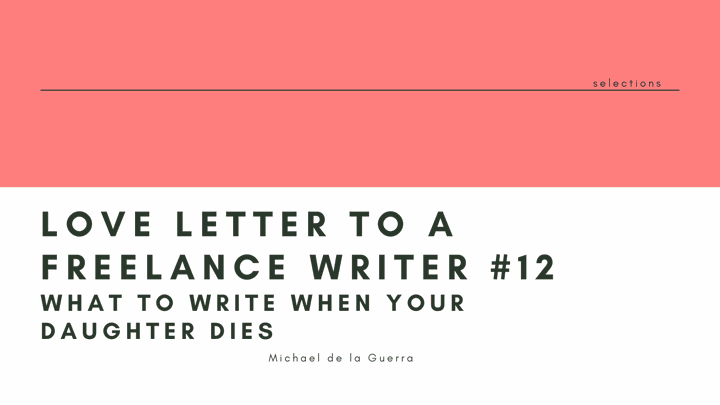
Love Letter To A Freelance Writer #12: What to write when your daughter dies
Dear reader,
I’d like to tell you a story about one of the most celebrated writers in American history. On December 30, 2003, Joan Didion’s daughter, Quintana, was unconscious in the ICU. She’d gotten very sick with pneumonia. Joan and her husband John were having dinner that night, when he had a heart attack.
It was fatal, and he died.
Joan put off funeral arrangements for three whole months, so Quintana could be well enough to attend. After the service, Quintana got on a plane at LAX and collapsed from a hematoma and required brain surgery. A long battle ensued, but unfortunately, Quintana passed away in 2005. In the span of only two years Joan Didion—an already accomplished, praised, and prolific writer—lost her husband and daughter.
So what did she do? She wrote.
Before Quintana passed, she wrote a book chronicling the year after her husband died. It’s called The Year Of Magical Thinking. It won a bunch of awards and was a finalist for the Pulitzer Prize that year. It’s fantastic, and if you haven’t read it, you should. She was on a book tour for it WHEN Quintana passed. After that, she continued to write.
Now I’m not going to take this as an opportunity to aggressively tell you you don’t have any excuse for not taking action on your goals or writing. If you’re someone who struggles with that, the guilt you place on yourself is hard enough (I know this to be true because I struggle with that guilt myself). The reason I bring this up is to share this amazing story of perseverance with you, and to share this quote from Joan:
“Grammar is a piano I play by ear, since I seem to have been out of school the year the rules were mentioned. All I know about grammar is its infinite power.”
Now even if you don’t want to be a journalist or do the kind of writing she did, there’s still an important lesson here. What is she saying? This is one of the most celebrated contemporary writers saying she doesn’t know a whole lot about grammar, and even though she respects its power, she still “plays it by ear”—meaning she still writes regardless of that fact. And even in the face of horrific grief…
She wrote.
Our minds will ALWAYS come up with reasons to not write—it’s one of the hardest parts of being a writer. But we persevere. Even if all you know about grammar is its infinite power, because you don’t know much about interrogative pronouns or intervening phrases, that’s okay, because neither did Joan Didion.
Of course it’s better if you do, and Joan probably knows a lot more than she lets on. But there was still no reason for her to stop writing. And whatever reason you might come up with now or in the future shouldn’t be either. Whether we’re writing for clients or ourselves, we show up and do the work, regardless of the circumstances. Deadlines help. Outlines help. External pressure helps. But when it’s just us and the blank page, all alone at whatever surface your laptop calls home, if we don’t write, there’s someone else who will. Your voice, the voice of the businesses you help, and the stories the readers of the world need to hear… well, they won’t get heard if you don’t show up. Keep writing, friend :-)
- M
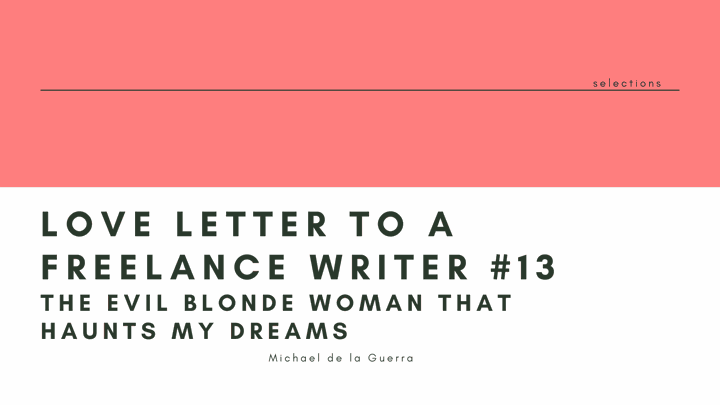
Love Letter To A Freelance Writer #13: The evil blonde woman that haunts my dreams
Dear reader,
A friend invited me to a screening for a major Hollywood movie that was slated to come out in about a year. The celebrities involved—and financial interests behind it—I must keep secret, as I signed an NDA. But they were massive. When it came out, though, it tanked. Studios do these screenings so they can ask the audience what’s working about the film and what’s not. And I had some problems with this particular movie.
When it ended, and the editor asked for questions, I quickly raised my hand. There was a hip blonde woman sitting in front of me who turned her head to glare at me as soon as I spoke. I shared that the scenes in which the two main characters were shown bonding (it was a spin on the old buddy cop film) felt too long. “The jokes were good, and they were funny, but they dragged out,” I said.
The woman shook her head, as if that were her favorite part. She snarled at me and raised her hand in defiance. What’s funny is she didn’t have much to add. “I think it was good; you just have to kill some of your darlings,” is what she said when it was her turn.
That’s it. She rehashed the same old “kill your darlings” advice people have been saying since Stephen King ripped it from someone else. Now every time I struggle when writing, I see her face—it’s like a curse. It’s very much like the feeling I had when I first started writing for clients and larger audiences: judged.
Even when I started to gain traction and respect, notes back from clients and editors were some of the most tense moments (who knew a Google Doc comment could wield so much power?). But you learn to live with them. And the notes I’ve gotten back from some of my mentors and clients have not only made me a better writer, but made me a ton of money, too.
So don’t fear judgment or feedback—welcome it. It’s helpful, especially early on. There will be times when you get feedback you know is BS, but it’ll be easier to spot as you get better. However, the best writers I know—and have read about—seek feedback, and take the harshest of it even in the face of shame and judgment. They know there are always holes they’ll miss. Just like the studios and their pre-release screenings know they must court feedback. The difference is those that court feedback, and implement it well, improve. Those that don’t, tank.
- M
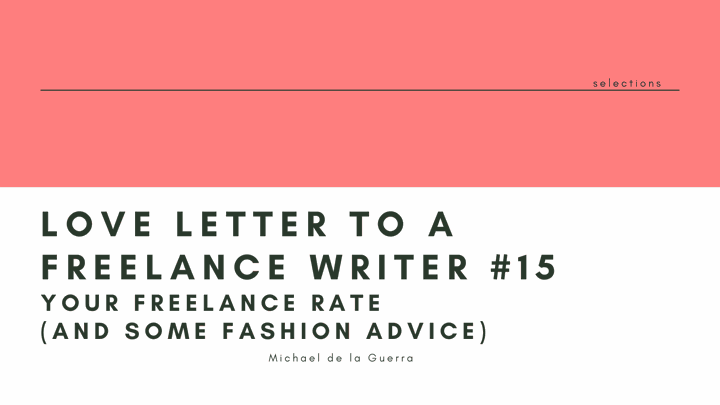
Love Letter To A Freelance Writer #15: Your freelance rate (and some fashion advice)
Dear reader,
“There’s about $50K worth of bags in my closet!” A girl I dated who was really into fashion, and spent tens of thousands of dollars on designer bags, once said that to me. She was leaving town, and was worried someone would break into her place.
“What would anyone want to steal from you?” I said.
A lot, apparently. Fashion is subjective, and it doesn’t solve real problems, but here’s a problem you might have: how much should I charge?
What does everyone else say? “Look at the market!” “I charge this, she charges that, so you should charge this.”
I’d like to challenge this and ask you two simple questions: How much do you want to make? How much would you need to charge in order to make that? Now with those in mind, come up with your hourly rate. Pretty high, isn’t it? That’s okay, because that’s your number, and you deserve to have it.
Now ask yourself this: Can you charge that much for what you currently provide? If not, what is a market you can move into that would allow you to charge that, or what can you provide in addition to what you already provide that can raise your value?
No one asks these questions. They’re too hard. People would rather ask a bunch of random people on Facebook what they think. Why they do that is beyond me. If I wanted a bunch of indignant strangers dictating to me what I could and could not charge, I’d seriously consider getting my mental health checked. Don’t assign yourself value based on what others say.
Wanna make $5K a month working only 20 hours a week? That’s $125/hour. Why aren’t you charging that? Maybe because you’re looking for love in all the wrong places. And by love I mean clients. Not sure how? I put together a list of 15 pieces of writing businesses will actually pay you money for. You can download it here (no opt-in required): https://bit.ly/2zRylKd
Start there. Then, figure out who in your niche or industry needs those pieces of writing, and go tell them. And when they ask, “How much?” tell them your new rate with confidence. I dare you :-)
- M
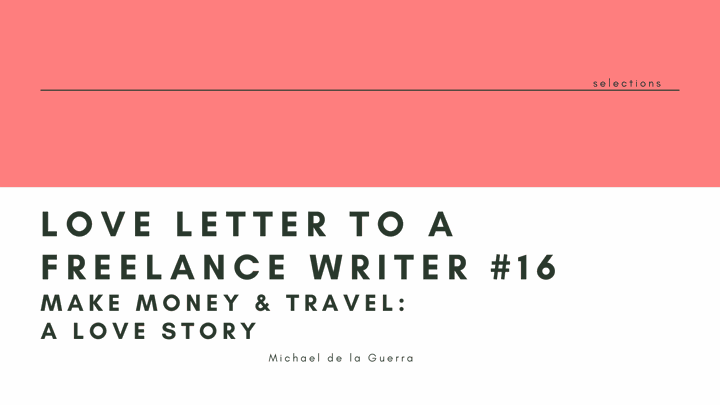
Love Letter To A Freelance Writer #16: Make Money & Travel: A Love Story
Dear reader,
There once was a tattoo model I met on Instagram who lived in New York. She was beautiful and funny, and when I slid into her DMs we talked for hours. So when I decided I was going to live in Brooklyn for a couple months, naturally we decided to meet. A total disaster ensued.
We went on a cute sushi date, then left to see the New York City skyline from a rooftop. After a few hours, I kissed her goodbye, put her in a cab, and went home. Then something strange happened. She ignored me for a few days, and began giving me cold one-line responses here and there. I didn’t know what happened, but wanted to find out, so I kept engaging. Until she decided to say something truly awful.
I won’t repeat it, but it had to do with her rolling around in bed with another person. Of course I replied with an insult rather than expressing myself and moving on, and so we argued for a few days until I gave up. Even though I was angry, and mostly just curious as to why she became so mean after what I thought was a good date, I let it rest.
Why waste time? I channeled it all into a really great short story, so I guess that’s a plus, since writing gave me the freedom to travel and fall in love in a new city, which brings me to my point: you wanna make more money so you can travel? (Some of you don’t and just want more money so you can buy nice things, and if that’s you, you should still listen up.)
Step one: find a niche, create great work, reach out to clients, get paid. Done. Now, to travel… Repeat step one until you have enough money and time to travel. Then, go fall in love with someone in a new city.
If you’re married or in a relationship, go fall back into love with your partner in a new city. And if you don’t want to travel, go put all your new money into a bank account and watch Netflix. Either way, the steps are simple.
- M
Click here to read part three.
